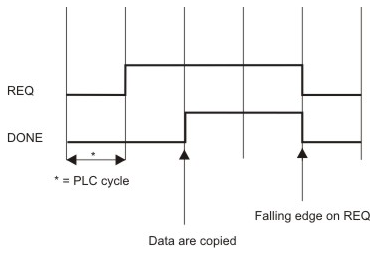|
Notes
|
- ' * ' is a placeholder for the supported data types. The FB is available for the data types BYTE, WORD, DWORD, LWORD, SINT, INT, DINT, LINT, UDINT, UINT, ULINT, USINT, TIME, REAL, LREAL, STRING, WSTRING, LTIME, LDATE, LTOD, and LDT.
- For the STRING/WSTRING data type the operation is different to the following described. For information about the handling of the STRING_TO_BUF/WSTRING_TO_BUF function block
click here.
- It is not allowed to use the same addresses for the source and the destination.
- Function blocks have to be instantiated. The instance name of the function block has to be declared in the 'Variables' table of the POU where the FB is going to be used. The instance name must be unique within the POU.
|
 Timing diagram
Timing diagram
 REQ
REQ
 BUF_FORMAT
BUF_FORMAT
 BUF_OFFS
BUF_OFFS
 BUF_CNT
Input/Output
BUF_CNT
Input/Output
 SRC
SRC
 BUFFER
Outputs
BUFFER
Outputs
 DONE
DONE
 ERROR
ERROR
 STATUS
STATUS
